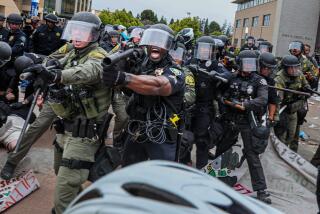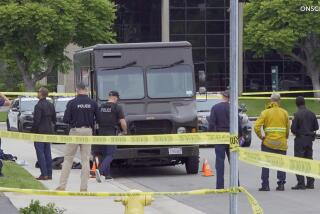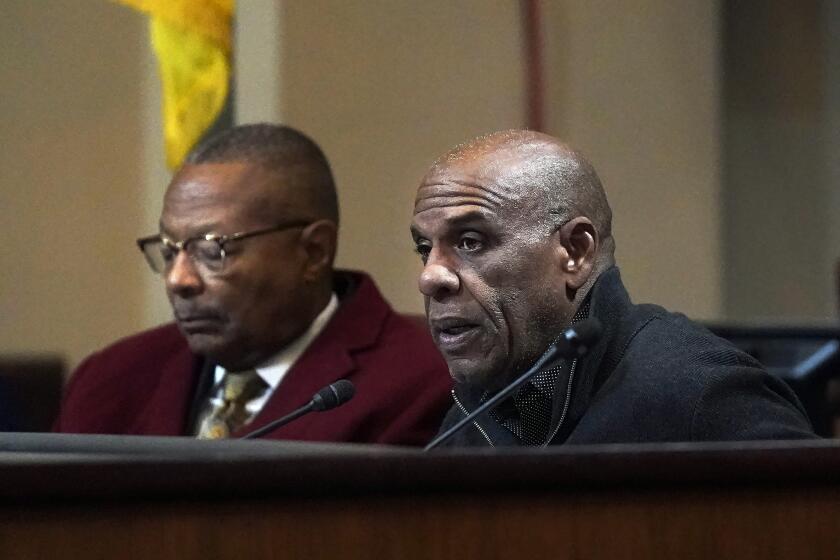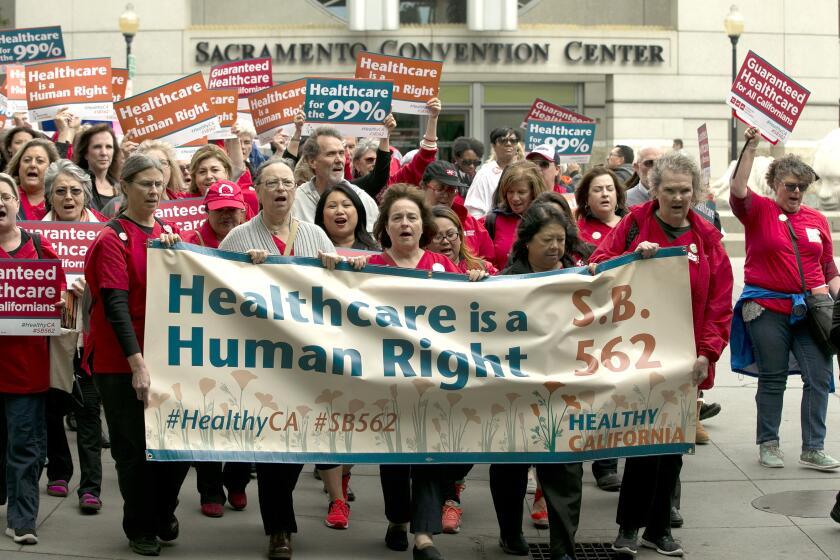McCarty Memo Blasts City Manager’s Probe of Kolender
San Diego Councilwoman Judy McCarty, in a confidential memo, has sharply attacked the adequacy and integrity of City Manager John Lockwood’s investigation into allegations that Police Chief Bill Kolender fixed traffic tickets, assigned city employees to do personal errands and furnished guns to his friends.
The detailed, four-page memo criticizes Lockwood for providing incomplete information to City Council members and to the public about Police Department improprieties. It also poses a series of pointed questions that Lockwood never addressed in his written report.
McCarty’s memo is dated Nov. 26, a day after Lockwood released his findings and announced that he had given Kolender and Assistant Police Chief Bob Burgreen written reprimands for their misconduct. The Times obtained it from her office on Friday after filing an open records request.
In her memo, McCarty tells Lockwood she is “troubled” and “disturbed” about portions of his investigation, and she complains that the Police Department has provided explanations that are “thin” on credibility.
“The issue here is one of credibility and integrity. I must believe I get a straight answer from the Manager and the Chief, no matter how damaging that answer is and that is my concern. Have you gotten straight answers? Are you truly satisfied with some of these explanations?
“My feeling is that this has just been ‘Get Kolender Week.’ I don’t want to be part of that, but I also want a complete report and a report which I feel answers the questions fully. The statement leaves as many questions as it answers,” McCarty wrote.
“A lot of fine people in San Diego have had their careers ruined for a lot less than I see here,” McCarty wrote in the memo. “More importantly, a society which does not or cannot respect its police authority is a society in trouble.”
McCarty on Friday declined to elaborate on the memo but said she has met with Lockwood twice on the matter. “He has gone back and looked at things, and come back to me with answers which I believe,” she said.
McCarty also said her questioning of Lockwood is not finished. “He is responding,” she said.
Lockwood on Friday refused to say what answers he furnished to McCarty, adding that he won’t answer any more questions from the press about his administrative review of Kolender and Burgreen.
“At some point, I have to decide my priorities--whether I’m going to get back into the business of filling pot holes and cleaning beaches, or whether I am going to have to spend hour after hour to continue to flog myself and the department over a series of things that have happened and have been investigated,” Lockwood said.
A Police Department spokesman said late Friday that Kolender had no comment.
Lockwood began his investigation after The Times found that Kolender and his top assistants dismissed thousands of parking tickets and dozens of traffic citations--many for families, friends, influential San Diegans and the media--since 1985. In many cases, The Times found, tickets were dismissed based on fabricated excuses and without investigation.
The city manager also investigated charges that Officer Jeanne Taylor, assigned to “light duty” in the chief’s office between 1980 and 1981, was used by Kolender and other high-ranking police administrators to run personal errands. Taylor’s diary about her job has been filed with the city’s Civil Service Commission as part of an allegation that high-ranking police administrators intimidate officers who file disability claims. The commission has decided to conduct an investigation of its own into the charges.
Lockwood also investigated allegations that Kolender provided guns to his friends, and used his position to help one of them buy a new handgun without waiting the 15-day “cooling off” period required by state law.
After a two-week administrative review, Lockwood issued an 11-page report that confirmed most of the allegations and announced that Kolender and Burgreen would receive written reprimands. In an interview, Lockwood said his report wasn’t a “whitewash” because the men would have to live with the stigma of being publicly upbraided.
Most City Council members greeted Lockwood’s effort with praise. Mayor Maureen O’Connor said the report was “fair and candid” and showed that Lockwood was “going to be a strong city manager.”
But the next day, McCarty fired off her memo criticizing the report. “It seems to me that there are some questions which have not been answered, and what concerns me more is that we do not appear to be going out to get the answers,” she wrote.
The City Charter prohibits council members from interfering with personnel decisions made by the City Manager.
McCarty said Friday: “I am not in a position to comment on the punishment. That is the city manager’s position. The City Charter gives him the responsibility to handle that. He did. And I’m not commenting on that at all.”
Among McCarty’s criticism and questions were:
- Why Lockwood didn’t fully investigate the sale of a gun by Kolender to a friend in April, 1981. Taylor wrote in her diary that the chief had her drop off the gun to “Frank Curran” at San Diego Jack Murphy Stadium in exchange for a check for $233.20. Taylor’s attorney, Patrick J. Thistle, said the person who received the gun was Pat Curran, business manager for the San Diego Chargers.
Lockwood reported that Kolender couldn’t remember the transaction and that Curran “states that he did not receive anything from Officer Taylor.”
“If Officer Taylor is lying, this is extremely important for this City to know that, because we have at least two investigations under way based largely on her diary,” McCarty wrote. “If Taylor is not lying, then the individual is. Why? On the surface, it appears to be a simple transaction. Is it? Has anyone asked the individuals involved if their checking accounts for that period can be examined to see if such a check was drawn or cashed? Have the City accounts been checked? Has Officer Taylor been asked where the gun came from?”
McCarty, noting there are reports of other gun transactions involving Kolender, asked why Lockwood didn’t dig deeper to find out where the weapons were coming from and where the money went.
“Guns have a history and checks leave a trail. Have we attempted to learn the history or find the trail?”
- Why Lockwood didn’t address an incident in which Taylor was instructed to deliver .38-caliber shells from the police pistol range to one of Kolender’s friends.
- Why Lockwood never explored a statement by Taylor that Kolender told her to lie about the errands he asked her to run.
- A statement in Lockwood’s report that his investigation had “confirmed” Burgreen didn’t use the city postage meter to send out his fishing club newsletter. “How was this confirmed?” McCarty asked.
- Lockwood’s conclusion that Kolender didn’t send two San Diego detectives to Riverside to locate the address of his wife’s former son-in-law. Instead, Lockwood found that the detectives took a 30-minute side trip to drive by the man’s last known address at the request of a lieutenant, who overheard Kolender mention a problem with the former son-in-law during “idle conversation.”
McCarty wrote: “Is it credible to believe that two detectives were sent to Riverside because a lieutenant ‘overheard’ the Police Chief discussing his personal problem? Did the Lieutenant also ‘overhear’ the exact address of the relative?”
- Lockwood’s explanation that Burgreen used city film for photographs in a departmental newsletter and a memorial album. Taylor wrote in her diary that Burgreen asked her to get the film from the department’s supply room on four occasions in 1981 for his personal use, including fishing trips.
“Does it not seem strange that police photographers would go to the Assistant Chief to ask for film? Why would they not simply go to the property room or go through purchasing? Where do they normally get film for official use?” McCarty wrote.
- Lockwood’s finding that Kolender and his top assistants have not used officers to run personal errands since Taylor left the department in 1982.
“If I was told that it has been going on all the time and now it was going to stop, I could believe that,” McCarty wrote. “And I would accept that. But to ask me and the public to accept that these kinds of personal errands were run only during Officer Taylor’s time in the Chief’s office is a little hard to believe.
“It is also hard to believe that Officer Taylor was correct on the minor items but incorrect on the major items such as getting the film for Chief Burgreen, the ammunition and the guns, and the postage,” McCarty wrote.
What was most disturbing, McCarty added, was that guns, ammunition and city property “appears not only to be used for the private benefit of the employees but perhaps also for the private benefit of their friends . . . .”
Saying that the investigation has an “appearance of openness but major questions remain unanswered,” McCarty said she was worried about the city’s credibility.
“In short, I am concerned about the quality and completeness of the information that has been given the Council and the public, information which is necessary for us to do our job and for the public to evaluate the situation.”
More to Read
Start your day right
Sign up for Essential California for news, features and recommendations from the L.A. Times and beyond in your inbox six days a week.
You may occasionally receive promotional content from the Los Angeles Times.






